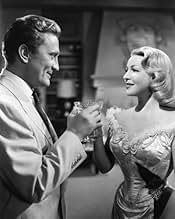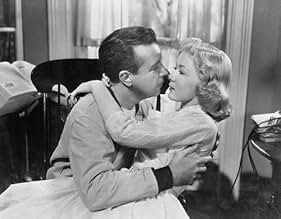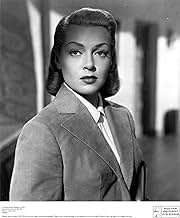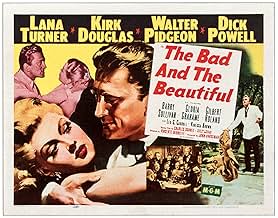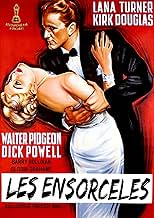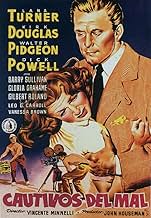IMDb-BEWERTUNG
7,7/10
17.244
IHRE BEWERTUNG
Ein skrupelloser Filmproduzent benutzt eine Schauspielerin, einen Regisseur und einen Autor, um erfolgreich zu sein.Ein skrupelloser Filmproduzent benutzt eine Schauspielerin, einen Regisseur und einen Autor, um erfolgreich zu sein.Ein skrupelloser Filmproduzent benutzt eine Schauspielerin, einen Regisseur und einen Autor, um erfolgreich zu sein.
- Regie
- Drehbuch
- Hauptbesetzung
- 5 Oscars gewonnen
- 7 Gewinne & 7 Nominierungen insgesamt
Jay Adler
- Mr. Z - Party Guest
- (Nicht genannt)
Stanley Andrews
- Sheriff
- (Nicht genannt)
Del Armstrong
- Georgia's Makeup Artist - Screen Test Scene
- (Nicht genannt)
Ben Astar
- Joe - Party Guest
- (Nicht genannt)
Barbara Billingsley
- Evelyn Lucien - Costumer
- (Nicht genannt)
Empfohlene Bewertungen
Glossy MGM soaper has many things to recommend it, not the least of which is a surprisingly grounded, natural Lana Turner (looking great, even in ordinary jammies) playing a successful movie actress who, along with a top screenwriter and director, help producer-on-the-skids Kirk Douglas stage a comeback. Not especially revealing about Hollywood, which at this stage wasn't quite ready to unmask itself, but still engaging and intriguing. Douglas is well-cast (he spits out his lines with a terse jaw--nothing new--but he's right for this part and is commendable). Turner is a revelation and deserved at the very least an Oscar nomination for her work; the picture did go on to win Academy Awards in five categories, including Gloria Grahame as Best Supporting Actress; Charles Schnee, Best Screenplay; Robert Surtees, Best Cinematography, Black-and-White; Best Art Direction-Set Decoration, Black-and-White; and Best Costume Design, Black-and-White. Well-directed by Vincente Minnelli, the picture gets less attention than something like "All About Eve", but it's actually more entertaining. *** from ****
Producer Jonathan Shields is in big trouble on a production and reaches out to three people he's befriended and betrayed in the past for help. All three are brought to Harry Pebbel's office where he makes a pitch for the help of each one. And we're told in flashback the dynamics of the relationships between Shields and each one.
One thing about Tinseltown, they've never been afraid to show the seamier side of movie-making. Kirk Douglas's Jonathan Shields is a not too thinly disguised version of David O. Selznick. The same drive, the same ambition, the same overwhelming ego that Selznick was legendary for is a part that was tailor made for Kirk Douglas.
The three betrayed people, director Fred Amiel(Barry Sullivan), star Georgia Lorrison(Lana Turner), and screenwriter James Lee Barlow(Dick Powell)all ring very true. One of the things I like about this film is that all three stories, each in itself, could be expanded into a film all it's own.
Lana Turner's role as the ersatz Diana Barrymore is not to hard to spot either. It's so much better here than the film based on her own book Too Much Too Soon. If that voice of Turner's actor father on those 78 rpms she's playing sounds familiar, it's that of Louis Calhern. Turner's was a life lived out all too well in the tabloids and she brings all of it to bear in playing Gerogia Lorrison.
Dick Powell, who was offered the lead as Jonathan Shields, opted to play tweedy professor turned screenwriter James Lee Barlow. This was Powell's next to last feature picture as an actor, it should have been the one he went out on. Powell was always ahead of the industry's cutting edge and he decided to concentrate more on directing and acting for the small screen.
Powell's segment includes Gloria Grahame as his flirty wife. Post World War II Hollywood, whenever it had a part for a tramp, first call Gloria Grahame. Here she responds with an Academy Award winning performance. She hasn't many scenes, but as was said in another MGM picture around that time, what there is is cherce.
I don't think there's ever been an actor who can go from zero to sixty on the emotional scale as quickly as Kirk Douglas. Check the scene when Lana Turner discovers how Douglas betrayed her. The intensity of his reaction alone is frightening and real. Douglas was also up for an Oscar, but it went that year to laconic Gary Cooper in High Noon.
Vincente Minelli put all the pieces together just right and it comes out great entertainment.
One thing about Tinseltown, they've never been afraid to show the seamier side of movie-making. Kirk Douglas's Jonathan Shields is a not too thinly disguised version of David O. Selznick. The same drive, the same ambition, the same overwhelming ego that Selznick was legendary for is a part that was tailor made for Kirk Douglas.
The three betrayed people, director Fred Amiel(Barry Sullivan), star Georgia Lorrison(Lana Turner), and screenwriter James Lee Barlow(Dick Powell)all ring very true. One of the things I like about this film is that all three stories, each in itself, could be expanded into a film all it's own.
Lana Turner's role as the ersatz Diana Barrymore is not to hard to spot either. It's so much better here than the film based on her own book Too Much Too Soon. If that voice of Turner's actor father on those 78 rpms she's playing sounds familiar, it's that of Louis Calhern. Turner's was a life lived out all too well in the tabloids and she brings all of it to bear in playing Gerogia Lorrison.
Dick Powell, who was offered the lead as Jonathan Shields, opted to play tweedy professor turned screenwriter James Lee Barlow. This was Powell's next to last feature picture as an actor, it should have been the one he went out on. Powell was always ahead of the industry's cutting edge and he decided to concentrate more on directing and acting for the small screen.
Powell's segment includes Gloria Grahame as his flirty wife. Post World War II Hollywood, whenever it had a part for a tramp, first call Gloria Grahame. Here she responds with an Academy Award winning performance. She hasn't many scenes, but as was said in another MGM picture around that time, what there is is cherce.
I don't think there's ever been an actor who can go from zero to sixty on the emotional scale as quickly as Kirk Douglas. Check the scene when Lana Turner discovers how Douglas betrayed her. The intensity of his reaction alone is frightening and real. Douglas was also up for an Oscar, but it went that year to laconic Gary Cooper in High Noon.
Vincente Minelli put all the pieces together just right and it comes out great entertainment.
"The Bad and the Beautiful" takes a look at Hollywood. This incisive take about how movies are made, directed by Vincente Minnelli, dares to go behind the scenes to show what goes on in the way the film industry operates. The film adaptation by Charles Schnee gives us a good idea of that unreal world of fantasy and hype.
At the center of the story is Jonathan Shields, a young man with connections to the industry. He wants to follow his father's footsteps and goes at it vigorously, making friends and enemies along the way. Jonathan discovers he can be ruthless whenever he wants. His first victim is Fred Amiel, the talented director who Jonathan bypasses in favor of a more established one. Jonathan quickly forgets the friendship Fred and his wife showed him before becoming a big producer.
Then there is there is Georgia Larrion, the boozy daughter of a famous actor. Jonathan shows how he wants Georgia to succeed in the business, personally taking care of selling her to star in his big project, only to betray her with another woman, a glamorous bit player. When Georgia discovers the truth, she flees Jonathan's mansion in a clear night that suddenly turns into a torrential downpour and loses control of the car, but she doesn't suffer a scratch!
The last victim of Mr. Shields is the Pulitzer prize winner, James Lee Bartlow, who Jonathan coaxes into leaving his academic life to adapt his own novel for the movies. James is married to the flighty Rosemary, in whom Jonathan discovers a weak link that will do anything to hobnob with the celebrities. Jonathan makes it easy for Rosemary to fall into an affair with the star of Shields' film.
When we first watched this film, it seemed much better, than on this viewing where a lot of things surface to make some of the story much weaker than before. Some viewers have compared this film with the fate of Orson Welles in Hollywood, and there are a couple of references that could be interpreted that way. Whether it was so, or not, it's up to the viewer to guess where the truth lies.
Kirk Douglas gave a strong performance as Jonathan Shields. Mr. Douglas showed he clearly understood who this man was. He runs away with the film, in our humble opinion. Lana Turner, a beautiful presence in any movie, is good, but at times she appears to be overwhelmed by the range of emotions she has to project, especially with that phony car scene.
Dick Powell and Gloria Graham put in an excellent appearance as the Bartlows. Barry Sullivan disappears after Lana shows up, not to be seen until the end. Walter Pigeon is effective as the studio head. Gilbert Roland is perfect as Gaucho, the Latin actor with a lot of charisma.
Mr. Minnelli shows he wasn't afraid to portray the industry the way we see it in the film, not a small accomplishment, knowing well how it could have backfired on him. Hollywood is not forgiving to those who dare to show its ugly side and that's when the parallel with Orson Welles problems with the system and eventual exile can be drawn.
At the center of the story is Jonathan Shields, a young man with connections to the industry. He wants to follow his father's footsteps and goes at it vigorously, making friends and enemies along the way. Jonathan discovers he can be ruthless whenever he wants. His first victim is Fred Amiel, the talented director who Jonathan bypasses in favor of a more established one. Jonathan quickly forgets the friendship Fred and his wife showed him before becoming a big producer.
Then there is there is Georgia Larrion, the boozy daughter of a famous actor. Jonathan shows how he wants Georgia to succeed in the business, personally taking care of selling her to star in his big project, only to betray her with another woman, a glamorous bit player. When Georgia discovers the truth, she flees Jonathan's mansion in a clear night that suddenly turns into a torrential downpour and loses control of the car, but she doesn't suffer a scratch!
The last victim of Mr. Shields is the Pulitzer prize winner, James Lee Bartlow, who Jonathan coaxes into leaving his academic life to adapt his own novel for the movies. James is married to the flighty Rosemary, in whom Jonathan discovers a weak link that will do anything to hobnob with the celebrities. Jonathan makes it easy for Rosemary to fall into an affair with the star of Shields' film.
When we first watched this film, it seemed much better, than on this viewing where a lot of things surface to make some of the story much weaker than before. Some viewers have compared this film with the fate of Orson Welles in Hollywood, and there are a couple of references that could be interpreted that way. Whether it was so, or not, it's up to the viewer to guess where the truth lies.
Kirk Douglas gave a strong performance as Jonathan Shields. Mr. Douglas showed he clearly understood who this man was. He runs away with the film, in our humble opinion. Lana Turner, a beautiful presence in any movie, is good, but at times she appears to be overwhelmed by the range of emotions she has to project, especially with that phony car scene.
Dick Powell and Gloria Graham put in an excellent appearance as the Bartlows. Barry Sullivan disappears after Lana shows up, not to be seen until the end. Walter Pigeon is effective as the studio head. Gilbert Roland is perfect as Gaucho, the Latin actor with a lot of charisma.
Mr. Minnelli shows he wasn't afraid to portray the industry the way we see it in the film, not a small accomplishment, knowing well how it could have backfired on him. Hollywood is not forgiving to those who dare to show its ugly side and that's when the parallel with Orson Welles problems with the system and eventual exile can be drawn.
Winning an Oscar has nothing to do with the amount of on screen time, so the shortness of Grahame's role does not bother me. However, her cartoonish interpretation of a Southern Belle is simply not worthy of an Academy Award, especially when the role is intended to be seriously dramatic. Jean Hagen most certainly deserved the Supporting Actress honor for her APPROPRIATE comedic turn as an over-the-top, unfortunately voiced silent film actress in "Singing in the Rain." And, folks, that scene with an hysterical Lana Turner driving in the rain is, well, HYSTERICAL.
VM was an excellent director, but some of his films, especially the overwrought melodramas, simply do not hold up. Yes, they always look great, but often the performances in the dramas are of the scenery-chewing variety.
In regards to another user's post, I agree that the scenario of Powell's character identifying his wife is ridiculous. The same thought immediately crossed my mind when seeing it for the first time.
My feelings towards Douglas's performance are mixed. At times he hits the mark, but at others, it is pure ham.
The film is definitely worth seeing, but it does not deserve the status of "classic." Its presentation of the industry is clichéd. As others have stated, "Sunset Boulevard" blows this film out of the water.
VM was an excellent director, but some of his films, especially the overwrought melodramas, simply do not hold up. Yes, they always look great, but often the performances in the dramas are of the scenery-chewing variety.
In regards to another user's post, I agree that the scenario of Powell's character identifying his wife is ridiculous. The same thought immediately crossed my mind when seeing it for the first time.
My feelings towards Douglas's performance are mixed. At times he hits the mark, but at others, it is pure ham.
The film is definitely worth seeing, but it does not deserve the status of "classic." Its presentation of the industry is clichéd. As others have stated, "Sunset Boulevard" blows this film out of the water.
One thing that I've always wondered is why no one looks at Hollywood more negatively than Hollywood itself. But whatever the reason, "The Bad and the Beautiful" pulls no punches in looking at its topic. The movie portrays some people explaining how they used to be friends of producer Jonathan Shields (Kirk Douglas) but have since turned against him. There's the director whom Shields promised a directing job but betrayed him, the writer who lost his wife to Shields's actions, and the actress whom Shields drove to madness.
I thought that one of the most effective scenes in the movie was Kirk Douglas holding Lana Turner in his arms. Here he is, this overbearing, hostile character forced to almost coddle his gorgeous female star; it might be showing how he may seemingly have exalted her, but he remains in a higher position and is merely using her and sending her into insanity. And the scene of her driving the car while completely upset elaborates on this idea.
And then, there's the writer. He and his wife move from Virginia hoping to get really big in Hollywood...until tragedy strikes. It all goes to show the disaster inherent in any industry (of course, Douglas's character exacerbates any problem). But anyway, this is a formidable part of cinema history; a precursor to movies like "The Player". Also starring Dick Powell, Walter Pidgeon and Gloria Grahame (who won Best Supporting Actress).
I thought that one of the most effective scenes in the movie was Kirk Douglas holding Lana Turner in his arms. Here he is, this overbearing, hostile character forced to almost coddle his gorgeous female star; it might be showing how he may seemingly have exalted her, but he remains in a higher position and is merely using her and sending her into insanity. And the scene of her driving the car while completely upset elaborates on this idea.
And then, there's the writer. He and his wife move from Virginia hoping to get really big in Hollywood...until tragedy strikes. It all goes to show the disaster inherent in any industry (of course, Douglas's character exacerbates any problem). But anyway, this is a formidable part of cinema history; a precursor to movies like "The Player". Also starring Dick Powell, Walter Pidgeon and Gloria Grahame (who won Best Supporting Actress).
Wusstest du schon
- WissenswertesAt 9 minutes and 32 seconds, Gloria Grahame's performance in this movie became the shortest to ever win an Oscar. She held the record until 1976, when Beatrice Straight won for her 5 minute performance in Network (1976).
- PatzerThe story takes place over an 18-year period, roughly 1934-1952, but the hairstyles and clothing of all the women, from beginning to end, are strictly 1952.
- Alternative VersionenAlso available in a computer colorized version.
- VerbindungenFeatured in Die Welt, das Fleisch und der Teufel (1959)
Top-Auswahl
Melde dich zum Bewerten an und greife auf die Watchlist für personalisierte Empfehlungen zu.
- How long is The Bad and the Beautiful?Powered by Alexa
Details
- Erscheinungsdatum
- Herkunftsland
- Sprache
- Auch bekannt als
- Cautivos del mal
- Drehorte
- Produktionsfirma
- Weitere beteiligte Unternehmen bei IMDbPro anzeigen
Box Office
- Budget
- 1.558.000 $ (geschätzt)
- Weltweiter Bruttoertrag
- 2.025 $
- Laufzeit1 Stunde 58 Minuten
- Farbe
- Seitenverhältnis
- 1.37 : 1
Zu dieser Seite beitragen
Bearbeitung vorschlagen oder fehlenden Inhalt hinzufügen




